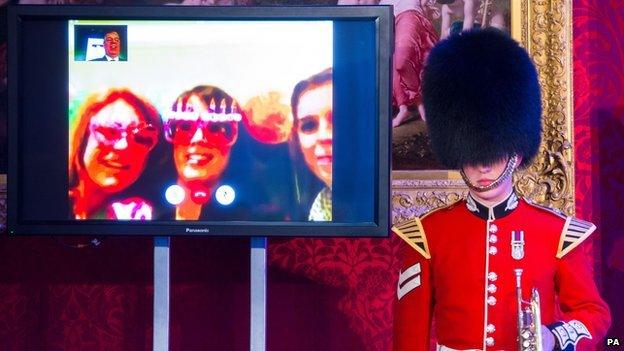Glittering spires and silicon roundabouts
- Published
- comments

Good news in the last 24 hours about two UK tech firms. Both are clever software businesses based in London but in each case the founders studied in Cambridge. A sign perhaps, that Cambridge knowhow and London's marketing skills are combining to good effect.
The first is Improbable, a business founded by a group of Cambridge computer scientists which creates virtual environments for use in everything from gaming to high finance. "We are building the operating system for simulated worlds," is how its chief executive Herman Narula describes its mission to me.
And that ambitious aim has now attracted one of America's smartest venture capital firms, Andreessen Horowitz. Having already put money into Facebook, Twitter and Oculus Rift, the venture fund cofounded by the creator of the first popular web browser Netscape has now put $20m (£14m) into Improbable.
What it has latched onto is the fact that this company, founded at Cambridge University just three years ago, appears to have solved a hard computing problem, building large and complex virtual worlds. Herman Narula explains the challenge: "How do you simulate a world which can involve millions of entities which all need to interact with each other?"
Improbable's answer is not a single piece of software but an operating system which allows developers to build worlds on a much bigger scale. At first, this was applied in video games but now it's being tried in other fields. One example - researchers at Oxford's Institute for New Economic Thinking are using the system to build economic models which require many millions of entities and interactions to be effective.
War gaming could be another application - Improbable is just starting to work with the Ministry of Defence - and urban planners and finance companies are also potential customers. "It turns out," says Narula, "that anyone who wants to ask a 'What if' question about a system that exists in the real world needs to run these kind of simulations."
As well as being good news for a company which will now be firmly in the spotlight of tech investors on both sides of the Atlantic, Improbable's success is also a fillip for London. For all the hype, it has sometimes seemed there is precious little tech in Tech City. Now, along with the artificial intelligence business Deep Mind which was snapped up by Google last year, we have another company which seems to be employing real scientists rather than just marketers or social media strategists.
The other good news for London came in the rather unlikely setting of St James's Palace last night. The third Pitch@Palace event, hosted by the Duke of York, saw 14 young companies each given three minutes to convince a room packed with angels and venture capitalists that they were the future. The pitches - kept to time by a guardsman who sounded a bugle when the allotted time was up - were largely impressive. They ranged from Opendesk, a global network of professional furniture makers, to PlotBox, which described itself as "software as a service for the death industry" using drone imagery to help cemeteries plan more efficiently.

Prince Andrew in a video link with his family at the Pitch@Palace event
But the winner of the audience vote was Jukedeck, another business based in London but built on Cambridge expertise. The company makes software that composes music autonomously for use in videos, games and anywhere else that needs a soundtrack. The founders aren't computer scientists but instead studied music and history at Cambridge.
As I listened to the pitch, I realised that I'd met Jukedeck in Cambridge last year, where its founders had just won backing from a new venture capital fund based in the university town. Since then, they've moved firmly to London - in fact, they're based in Old Street just off the famed Silicon Roundabout, and their website tells us they have a piano in the office. So far, so cliched.
But looking at a job advert on the site for a software engineer it's clear that Jukedeck is far from a run-of-the-mill Shoreditch start-up. As well as "a brilliant understanding of the C++ 11 programming language" the ideal candidate will need to be extremely musical and "have attained Grade 7 in at least one musical instrument".
So, two ambitious young companies combining all sorts of high level skills from London and Cambridge to produce what could be world-beating software. Let's hope the UK has the money and skills to keep them happy here, rather than heading off to California.